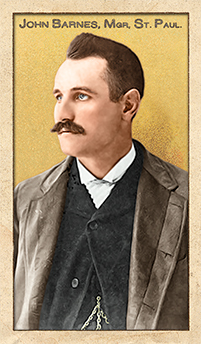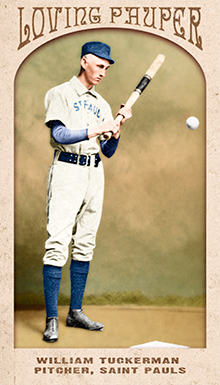
- Series: 1880s: Loving Paupers
- City: St. Paul
- Team: Apostles
- League: Western Association
William H. Tuckerman (1866-1904) pitched for five seasons in the minors beginning in 1886 with Brockton of the New England League, close to his Connecticut roots. On July 16 of his rookie year, young Tuckerman hurled a no-hitter against the Boston Blues. He moved west to Minnesota and Wisconsin before landing with the Apostles of St. Paul for the 1888-’89 seasons. William had an outstanding campaign in ‘88. His 17-12 record belied an outstanding 1.74 ERA, sixth in the Western Association. Unfortunately, Tuckerman lost that command. In 1889, still with St. Paul, he saw his ERA rise to 3.49 with a 14-13 record. He did not play in ‘90 but re-emerged back home with the Providence Clamdiggers of the Eastern Association in ‘91. He won three and lost one with a fine 2.15 ERA before leaving pro ball..
- Tuckerman was captured by the Old Judge photographer in his Apostles uniform in 1889. The five images show him in a right-handed pitching motion. Curiously, William is called A. M. Tuckerman in all the offered examples of those cards. Baseball Reference has him as William H. Tuckerman and we cannot account for the mix-up other than attributing it to the rough-and-tumble touring the Old Judge men did, trying to memorialize as many players of the day as they could.
- 1889 was a milestone of a much different order for Tuckerman than being caught by the Old Judge camera. He married Evelyn Walsworth on April 18 back in Rhode Island in Westerly, the town he died in at an early age in 1904
Auction History
Cartophilia
Old Judge Pose: 466-2
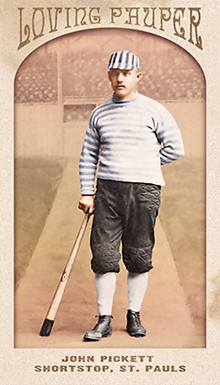
- Series: 1880s: Loving Paupers
- City: St. Paul
- Team: Apostles
- League: Western Association
John Thomas Pickett (1866-1922) was a utility infielder/outfielder who earned three brief chances in the major leagues. First, after tearing up the Western Association for St. Paul in 1888-89, John was given a try by the American Association’s Kansas City Cowboys late in the ‘89 season. He got to play quite a bit for a late-comer that year, getting into 53 games at three positions. He managed only a .224 average. Fortunately for Pickett, 1890 was a volatile year in the majors as the Players’ League siphoned off as much talent as they could lure to their rogue enterprise and John got a chance with the Philadelphia Athletics where he did much better, hitting .280 in 100 games. The diluted talent allowed many of the Players’ players to excel that single year of the league’s existence, similar to what had happened in 1884 as the Union Association played spoiler to baseball’s establishment. Two years later Pickett got his last chance in the big leagues with the cellar-dwelling Orioles. Tommy Lasorda has famously postulated that the best teams lose a third of their games and the worst win a third of theirs. Baltimore defied Tommy’s sage observation by winning 19 and losing 54 en route to a last place finish in the AA in ‘92. He hit .213 for the struggling Birds - totally unlike his usual solid hitting in the minors. John had begun in pro ball with Stillwater of the Northwestern League in 1884 and played later for Milwaukee and Minneapolis in the same circuit. He was still hitting near .300 in his final Western Association appearances with Kansas City and Minneapolis in 1897 as he wrapped up his time in the minors.
- One sweet note that Pickett could take with him was that when the Orioles let him go, he was replaced at second base by a young firebrand named John McGraw
Auction History
Cartophilia
Old Judge Pose: 369-2
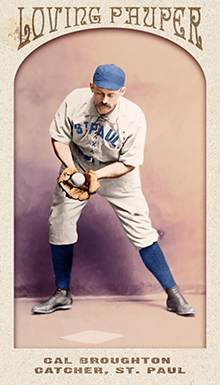
- Series: 1880s: Loving Paupers
- City: St. Paul
- Team: Apostles
- League: Western Association
Cecil Calvert Broughton (1860-1939) had a lifelong love of baseball. He began playing on the amateur diamonds around Evansville, WI and became one of his State’s first major-leaguers with the Cleveland Blues in 1883. After brief stints in the top-tier, Cal played with minor league and local clubs. At the end of his estimable life, having served as Evansville’s first police chief and civil servant, Broughton enjoyed listening to games on his radio as his life ebbed. Everywhere Cal played, news reports spoke of a beloved player, coach and man. Primarily a catcher, Broughton was known for his “head for the game” and his skill at managing pitchers. Brief stints with six teams from 1883-88 comprised his MLB tenure, while the bulk of his playing time was in the minors.
- A beloved local hero, Cal captured train robbers in a gunfight, and pinched the area’s first car thieves in 1913
- His salary as the first elected top cop: a sumptuous $35 a month
Auction History
Cartophilia
Old Judge Pose: 42-5
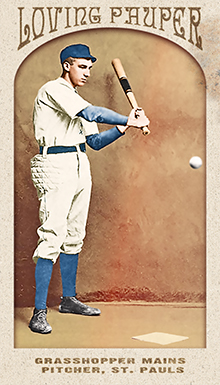
- Series: 1880s: Loving Paupers
- City: St. Paul
- Team: Apostles
- League: Western Association
Willard Eben Mains (1868-1923) had only a few brief appearances in the majors as a pitcher. He was 1-1 with the Chicago White Stockings of the National League in 1888 after starting in pro ball with Portland of the New England League the previous season. He returned to the minors in the Western Association and would go on to a successful career in the lower echelons, winning 318 while losing 179. In 1891 Grasshopper got a little longer opportunity with the American Association's Cincinnati Kelly's Killers and Milwaukee Brewers where he went 12-14. It would be another five years before his last shot in the big time, with Boston's Beaneaters in '96, where he was 3-2.
Mains, also known as Willie, was a product of one of the oldest families in his native Maine. He came out of Windham and would make a name for himself manufacturing bats. He had at least three factories in Sandy Creek, Harrison and Fryeburg, but marketed his product nationally. A Mains Dolley 31” bat circa 1890s recently sold for $400.
- Over his entire 20-year career in professional baseball, Mains played for 17 teams. He stayed in upstate New York for his final decade, closing out his tenure with the Binghamton Bingoes in 1906 after two lengthy tours with the Rome Romans and Syracuse Stars
- Willard inspired his son Jim to pursue careers in both baseball and bats. James R. Mains played first for Harvard in 1942 and got one appearance in the majors, with the Athletics, in August '43 where he lost his only start. Jim established his bat-making operation in Bridgton, Maine
- Perhaps it was his pedigree as a scion of the Down Easters that prompted the Old Judge photographer to record Grasshopper's surname as "Maines" on his St. Paul Apostles card series
Auction History
Cartophilia
Old Judge Pose: 290-2
- Series: Beginnings: 1880's
- City: St. Paul
- Team: Apostles
- League: Western Association
John Sloane Barnes (1855-1929) was a dapper dude, confidently embracing the challenges of pioneering the new national pastime in the 1880s and 90s. After toiling in the Upper Midwest with three St. Paul franchises, Barnes came into his own out in the Pacific Northwest, earning the title “Father” of that tradition. He founded the Pacific Northwest League in 1890 with Spokane, then helped get the Western League started. As that was the precursor to the new American League, Barnes left an indelible imprint on the modern game. Devoted not only to looking good, he traveled to Asia promoting physical fitness, returning in 1909 to helm the Butte Miners in the Inter-Mountain League.
- In 1890, John quickly helped arrange financing to commission teams in Seattle, Portland and Tacoma in addition to his Bunchgrassers, the champs that year




